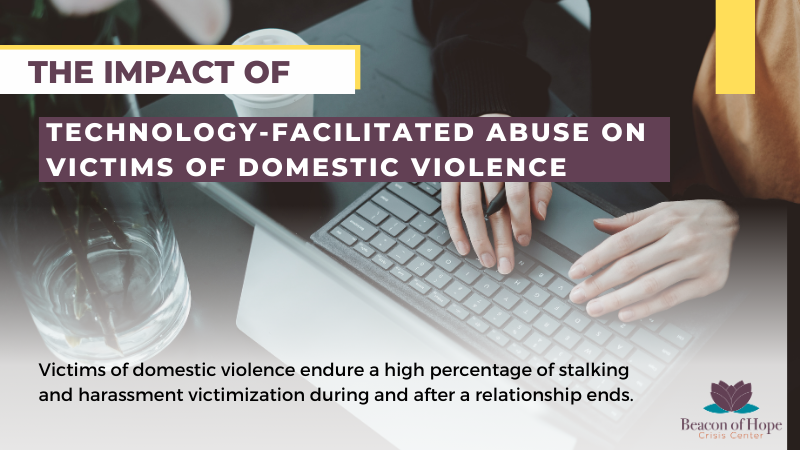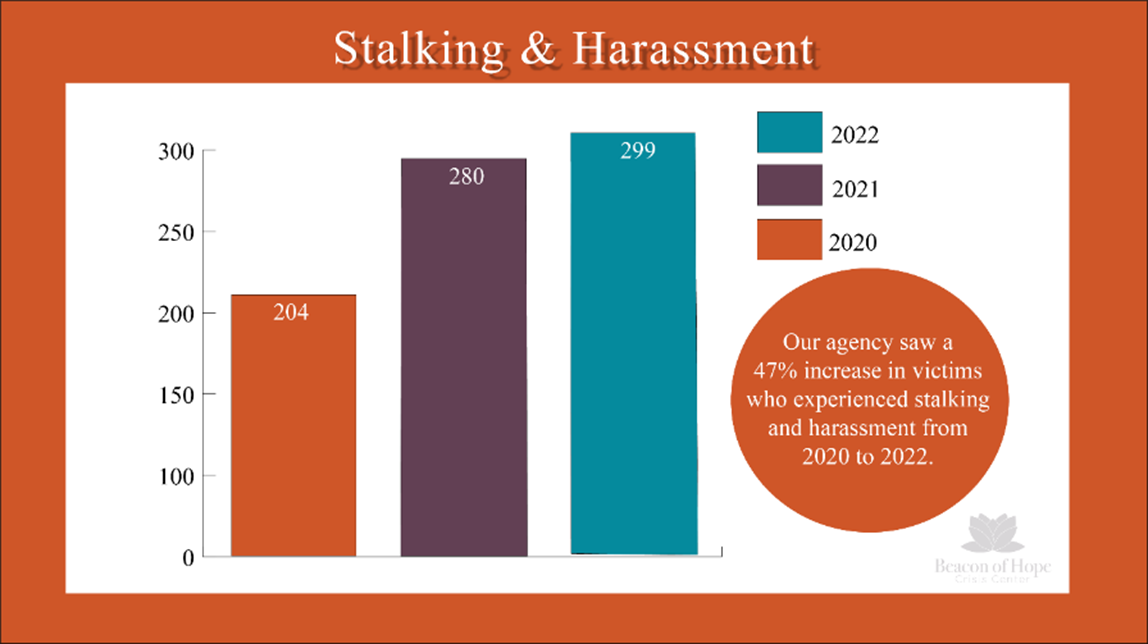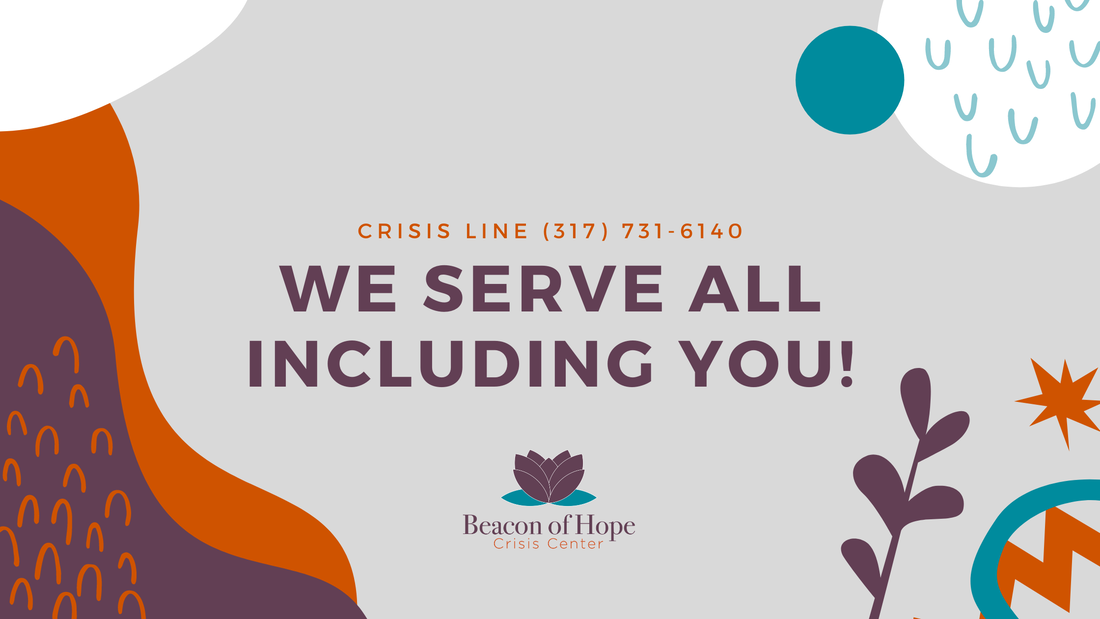|
By: Cheyenne Taylor and Savannah Archer Victims of domestic violence endure a high percentage of stalking and harassment victimization during and after a relationship ends. Beacon of Hope Crisis Center saw a 47% increase in victims who experienced stalking and harassment from 2020 to 2022. Specifically, technology-facilitated abuse has been on the rise. Victims have reported abusers tracking their phone activity and location through apps, tracking their physical location with the use of Tile Trackers and Apple Air Tags, improper use of other GPS devices, monitoring inside their homes with hidden cameras, misuse of doorbell cameras for surveillance, and other devices manipulated to perpetrate abuse. Our agency can now assist with checking a victim's vehicle for tracking devices; if found, that information can be reported and added to a protective order request for the court's consideration. We are also seeing victims report that abusers are using different apps to send messages when phone numbers or emails are blocked. Stalkers use apps such as social media platforms, banking, school sites, and other sites that don't always have traditional means of blocking content. Victim advocates complete training to help victims create technology and social media safety plans. There is no time to waste when it comes to securing accounts. Technology abuse is prevalent in our increasingly digital society. When abusers cannot access victims in person, they often use technology to monitor, harass, and stalk the victims. This gives abusers more access to perpetrate harm without disrupting their own lives and responsibilities. In one study, the National Network to End Domestic Violence reported that 71% of abusers monitor victims’ device activities, and 54% download stalkerware onto their partners’ devices. It is debilitating for a victim's mental health and affects their ability to utilize technology how the average person does: to take a break from their stressors. When the victim spends significant time at home, like following a medical procedure, working remotely, or during a global pandemic, abuse can become more pervasive. Reports show that the pandemic increased the rate and severity of technology abuse experienced. The pandemic also impacted abusers’ free time due to the loss of employment and working from home, which allowed them to modify or explore technology in new ways to harm victims. Technology abuse has been on the rise, and as technology develops and changes, so will the methods that abusers use to cause digital harm. Commonly, technology abuse can look like tracking devices, harassing messages, demands for intimate pictures or photos, and publishing private information about the victim. Spoofing is another example of technological abuse where the abuser disguises their messages or phone number to impersonate someone or to get around blocked contact settings. We are focused on enhancing prevention and safety planning for all victims at risk of technology-facilitated abuse. Senate Bill 161 passed, and Indiana now has a new law, unlawful surveillance. This bill adds a prohibition against using a tracking device to the list of conditions a court may impose when issuing a protection order. It also increases the penalty for stalking to a Level 5 felony if the offense is committed using a tracking device. A person who knowingly or intentionally places a tracking device on an individual or the individual's property without the individual's knowledge or consent commits unlawful surveillance, a Class A misdemeanor, unless certain exceptions apply, and increases the penalty to a Level 6 felony if the person is the subject of a protective order or has certain prior convictions. This change in the legislature establishes sentence enhancement if a person uses a tracking device to commit or facilitate the commission of a crime. Beacon of Hope Crisis Center will continue to advocate for victims, adapt to the changing times, and request improvements in the legislature to hold abusers accountable.
Emergency Hotel Stay Assistance "I received a crisis call from a local shelter advocate late one evening. The shelter advocate let me know that they had a victim of domestic violence that recently fled their abuser and had been staying on the streets with their children. The shelter advocate let me know that the victim had called all local shelters and all shelters in the area were at capacity, leaving the victim with no other safe option. I immediately asked to connect with the victim and began our process of requesting an emergency hotel stay for the victim and their children while they wait for shelter placement to become available.
The victim fled their abuser days before with the few belongings they could get out of the home. They and their children had stayed in their car for the past few days, parking in various places due to the abuser stalking them. The victim had nowhere to go and was too fearful to even sleep in their car. After answering all of my questions and telling me their story, the victim began crying. They told me that they were thankful for me even if I was not able to help their family find safe housing that evening because they felt heard. They told me how, in the days since they left, they felt like they were not being treated decently by those they had reached out to for help. I let the victim know I would do everything I could to find them and their children a safe place to stay this evening. When I called the victim less than an hour later to let them know that we booked a hotel room only minutes from where they were, the victim began sobbing. They thanked me profusely and told me I was their "angel." I was very glad to have given the victim and their children a safe place to stay." Victim Advocate - Beacon of Hope Crisis Center To learn more about our Impact on the community, register and join us during our Virtual Summit on October 26th. If you or a loved one needs supportive services for domestic violence or sexual assault, call our confidential crisis line at 317-731-6140. In the case of an emergency, contact 9-1-1 immediately. By: Cheyenne Taylor This year has been a difficult and trying year for many due to the impact of the pandemic, especially victims of domestic violence. While the world has been focusing on the pandemic, domestic violence has only escalated behind closed doors. It has not taken a break despite this pandemic. For victims, the pandemic has only created additional barriers in accessing services. We want to take this time to emphasize that we are here for all victims facing domestic violence victimization. We serve all.
We offer services that are accessible even during this pandemic. We have language services to help with translation needs. If you identify as a part of the LGBTQIA+, we serve you, and we have referrals as well. If you are atheistic or follow another religion, we are still here for you and respect your religious practices. We will not refuse to serve anyone because of race, gender identity, or other identifiers. We believe that everyone deserves to live free from the grip of domestic violence. Here are a few ways you can seek our help. First, you can call us directly at 317-731-6140 to speak confidentially with a victim advocate. Our advocates are on the lines from 8:30 am to 1 am. If we cannot pick up, please leave a detailed voicemail with your name, a return safe contact number or email, times to return your call and we will reach back out as soon as possible. Second, you can contact us through social media DMs. Facebook will get the quickest response, but you can reach us at any site easily accessible to you. Lastly, you can email us at info@beaconofhopeindy.org and we will get back in touch with you as soon as we can. Make sure to visit our website at BeaconOfHopeIndy.Org to learn about all our free services and resources that we offer. We are here to help you! By: Shelby Bubnick After experiencing trauma, you may be healing from injuries or feeling emotionally drained. It is essential to keep your body healthy and active during this time. Whether it happened recently or many years ago, there are many ways you can cope with short-term and long-term effects of trauma. Reactions to trauma can be psychological, emotional, cognitive, physical, and behavioral. Common reactions to trauma are listed below.
Psychological and Emotional
Coping with trauma can be hard to do on your own, do not hesitate to seek professional help. To speak with an advocate and learn more about services at Beacon of Hope Crisis Center please call our crisis line (317) 731-6140. By: Shelby Bubnick Children who have witnessed domestic violence may experience significant long-term effects. According to the Childhood Domestic Violence Association, 40 million adult Americans grew up living with domestic violence. Witnessing domestic violence can have a lasting impact on their lives and alter their hopes for the future.
Children who grow up in homes with domestic violence are three times more likely to repeat the cycle in adulthood as a victim in an abusive relationships or by becoming abusers themselves. * This can happen because violence becomes a norm in the eyes of the child and feel that they are at fault. 30% to 60% of perpetrators of intimate partner violence also abuse children in the household. ** Studies support the findings that rates of abuse are higher among those who were abused as children or who witnessed abuse as children. ** These children can also be at higher risk for health problems when they become adults. These can be psychological, such as depression and anxiety. While others may experience problems with their physical health such as diabetes, obesity, heart disease, and more. Many studies show that stress and trauma can impair children’s brain development. Adults who experienced significant early life stress have differences in brain structure compared to people who experienced low levels of early stress. * Early exposure to violence can influence an infant’s stress reactivity. This can have lifelong effects on psychological and physical health. Domestic violence can even affect a child before they are born as domestic violence often begins or grows more intense during pregnancy. This results in maternal stress, which can interfere with fetal brain development. * Long-term effects of witnessing domestic violence as a child:
*cdv.org **domesticshelters.org By Andrea Jenkins, MSW, LCSW Beacon of Hope Crisis Center offers in-house counseling services which removes many barriers for our clients including access to services, inability to pay for services, and incapability to self-advocate for needs. Our team can meet the needs of the women, men and families who contact us for services with competency and grace. During this challenging time, many of our clients are ready to receive support from a counselor to resolve presenting problems, experience personal growth, address problematic behaviors, and identify goals with potential solutions.
Counseling is a vital component to healing after being in an abusive relationship. It gives the person an opportunity to tell their emotionally filled story in a safe, non-judgmental place. For most, this is the first time they have been able to tell their story in its entirety including the role they played in the relationship. This courageous act is where internal healing begins. Coming to counseling for some is the first thing that they have done for themselves in years. In therapy, they can see their strength to move through their journey of hurt which allows them to go from victim to survivor. Beacon of Hope Crisis Center counseling services provide individuals and families an opportunity to visualize and work toward the future they want which for most is simply to be HAPPY AND SAFE. |
About this blog
This blog is about our domestic and sexual violence crisis center, Beacon of Hope. We hope you find it full of helpful information, motivation, creativity, serious facts and positivity. We hope that it will help you know what is happening in our center, in our community and with our events. We hope you follow our blog in support of our organization and our mission. Archives
October 2024
Categories
All
|
|
CAREER opportunities © 2024 Beacon of Hope Crisis Center Privacy Policy Accessibility Statement Training Portal Login |








 RSS Feed
RSS Feed